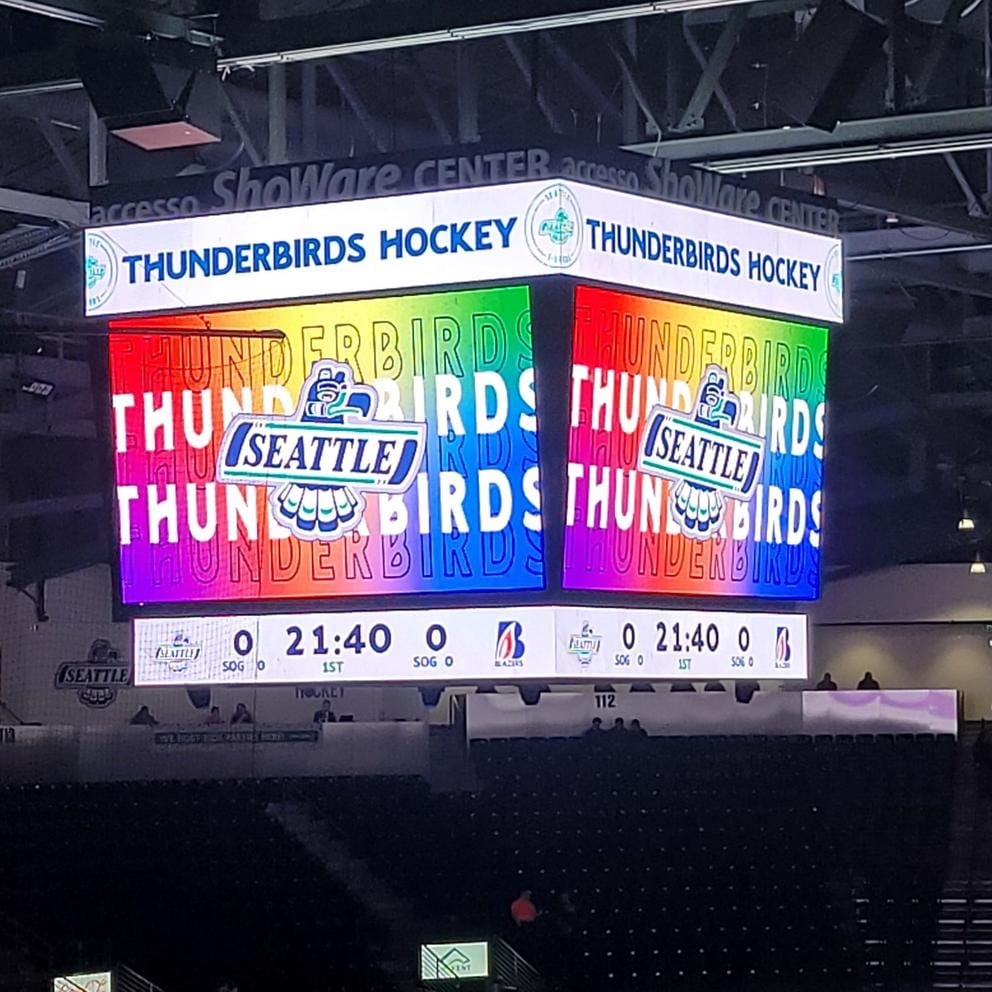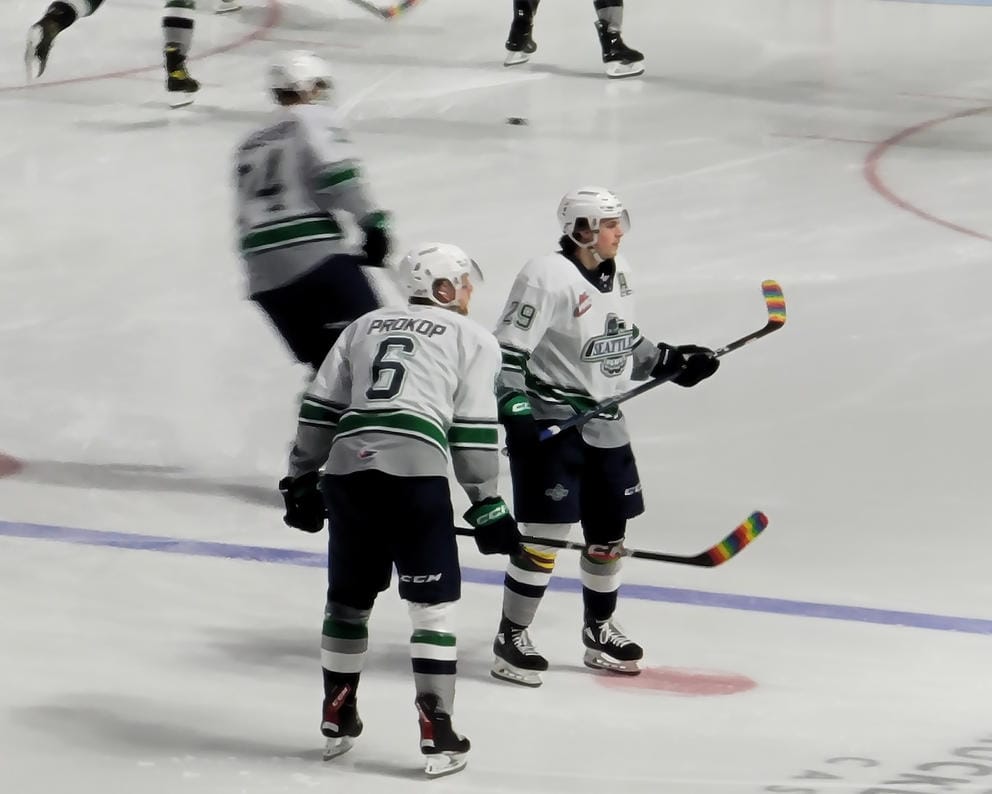The Seattle Thunderbirds came out to warm up for their junior ice hockey game against the Kamloops Blazers on March 21.
The warm-up looked a bit different than usual: All the Thunderbirds players had wrapped their hockey sticks in rainbow tape, a sign of support for teammate Luke Prokop and for the LGBTQ+ community in general.
For one night, the accesso ShoWare Center, the Kent arena where the team plays, was covered in rainbows. The Jumbotron displayed the Thunderbirds logo against a rainbow background. Fans wore handmade Pride shirts and waved Pride flags.
The fan-organized Pride Night came as National Hockey League (NHL) officials are pondering the future of Pride Nights, which started a few years ago as part of the league’s “Hockey is for Everyone” initiative to promote inclusivity among players and fans.
After several years of team Pride Nights with little fanfare, a few players have opted out for this season's events, citing everything from religious beliefs to politics. A few NHL teams decided not to hold a Pride Night at all.
But while the vocal opposition from a few players has generated much news coverage, the response to Pride Night during the Seattle Thunderbirds game last month shows there is much more support — at least in the Pacific Northwest — for such events.
Rebecca Bower, a social media manager in Seattle and a Thunderbirds fan who co-organized the Pride Night, said that other than a single snide comment on Facebook, the response was overwhelmingly positive.
“We had no idea it would get this big,” she said.
And the Seattle Thunderbirds Pride Night came about a week after the Seattle Kraken held its second annual Pride Night. During the March 13 event, team members wore a special Pride jersey designed by local LGBTQ+ artist Simson Chantha.

The jumbotron at the Thunderbirds' Pride Night in March. (Courtesy of Jarred Shelton)
From fan discussions to reality
The Seattle Thunderbirds are part of the Western Hockey League (WHL), a junior ice hockey league consisting of teams from cities throughout Western Canada, Washington and Oregon. The league is part of the larger Canadian Hockey League, though teams from four U.S. states take part. The teams comprise of players ages 16 to 20, with a limited number of 15-year-old players. Many of them go on to play in the NHL.
At the start of the current season, Prokop was traded to the Seattle Thunderbirds.
Prokop is a Canadian who previously played in the WHL for the Edmonton Oil Kings and Calgary Hitmen. He was drafted by the Nashville Predators, his favorite NHL team, in 2020. As he was under the age of 20, he continued playing in the WHL rather than the NHL's development leagues.
When he came out as gay in 2021, he became the first player under an NHL contract to do so. And he’s been vocal about the resistance to Pride Nights among NHL players and teams.
“Pride nights and pride jerseys play an important role in promoting respect and inclusion for the LGBTQIA+ community, and it’s disheartening to see some teams no longer wearing them or not fully embracing their significance,” Prokop wrote in a statement he posted on Twitter March 20.
Jarred Shelton, a longtime fan who runs TBird Tidbits, a Twitter fan account and fan site, expected the Thunderbirds to organize a Pride Night this season, especially with Prokop on the roster.
Other WHL teams, including the Spokane Chiefs and Portland Winterhawks, held Pride Nights. But by January, with no word from the Thunderbirds about whether it would hold a Pride Night, Shelton took note.
That month, in response to a tweet, Shelton wrote, “While I would hesitate to do something just because other teams are doing it … this is a pretty big omission.”
That got Shelton thinking about whether fans should take the initiative and organize a Pride Night. A month later, Shelton tweeted a graphic for a TBirds Fan Pride Night during the March 21 game.
Bower saw the graphic and contacted Shelton about teaming up. Bower had been working on organizing something as well. She had been in contact with Prokop and staff from the team where she had worked as an intern several years ago.
Prokop’s agent and the team supported the event, allowing Bower to design a rainbow version of the Thunderbirds logo and print shirts that fans could wear during the event.
The collaboration was ideal, Shelton said. Shelton picked the date but was happy to let Bower take care of the details. Both had access to many fans — Shelton had a Twitter following, and Bower ran several Facebook fan groups.
After several weeks of rapid organization, Shelton and Bower experienced more than one kind of win on March 21: The Thunderbirds defeated the Kamloops Blazers. And the success of the Pride Night made Shelton and Bower feel like winners long before the game ended.
“It felt like a very different atmosphere, a real positive one,” Shelton said. “It was a normal game, but it was the environment of seeing people just being comfortable.”
The event generated buzz on social media, with several fans posting photos of themselves in rainbow gear and Pride flags. Several fans thanked Shelton and Bower for organizing the event.
“Seeing these young men support their teammate [Prokop] so wholeheartedly did my soul so much good,” said Michaela Gray, a hockey fan and romance author, on Twitter. “I thought it might make y’all happy, too, considering what’s been going on in the NHL lately.”
Gray’s initial tweet about the event went viral, generating more than 14,000 likes and more than 2,100 retweets.
Bower, who had met Prokop several times, said she and fans also made a gift bag, which consisted of a handmade Thunderbirds Pride shirt, for Prokop. She noticed Prokop taking in the visible symbols of support around the arena while warming up.
“You can tell he appreciated the fan support,” she said.
Prokop was not available to comment on this story. Phoebe Balshin, senior account manager for Dulcedo Sports & Entertainment, provided a written statement: “He was so grateful to the fans for organizing that night and appreciated all the additional support from his teammates in wearing pride tape and promoting the important message.”

Luke Prokop publicly came out in 2021, the first player under an NHL contract to do so. He's now a visible representative of the LGBTQ+ community in North American ice hockey. (Courtesy of Jarred Shelton)
Growing organically
A spokeswoman for the Seattle Thunderbirds did not respond to several e-mails and calls requesting comment.
Bower, who has talked to the team about the event, said the staff was glad to back the fan event after it could not organize one.
But Bower hopes the success of the fan-organized event may spur the team to be more involved in the future. She’s hoping to talk to the team in the off-season, so there’s plenty of time to plan.
“They want to have more discussion,” she said. “[The fan event] gave them a good idea of how the event can go.”
The annual Pride Night for the Spokane Chiefs also started from the initiative of a single person, in this case a former player. Before a game in 2017, Jaret Anderson-Dolan wrapped his hockey stick in rainbow tape to show support for his mothers and other members of the LGBTQ+ community. His teammates joined in.
Anderson-Dolan said in a 2017 Spokesman-Review article that some people told him before the WHL draft that teams would not draft him because of his two mothers. He said was glad to be drafted by the Chiefs, which fully supported him and his family.
Anderson-Dolan now plays in the NHL with the Los Angeles Kings, but that spirit of inclusivity has remained in the Spokane Chiefs, which has held a Pride Night annually for several years.
Now fans can pre-order a Pride-themed T-shirt to wear during the event. And during its Pride Night games, the team provides tables for groups and organizations that support the LGBTQ+ community, including Spokane Pride, the Spokane AIDS Network and PFLAG Spokane.
Pride Night is one of the most popular events among fans, said Jay Stewart, the team’s vice president of business operations.
“We want to be inclusive to some groups that aren’t necessarily involved in hockey as they would like to be or can be,” he said.
Speaking out for inclusion
It’s not surprising to see young fans and players support Pride Nights, said Mark Alan Smith, a political science professor at the University of Washington.
“Gen Z, they’re more supportive of LGBTQ+,” he said. “They’ve grown up in a social media age. They’re used to constantly saying and doing things to signal allegiance to a cause. Older generations of athletes are much more like, ‘I just want to play hockey or basketball.’”
Shelton, who is in his early 40s, said fans his age and older must reject the notion that sports are an escape from social issues.
When “people say they don’t want to see politics in sports, it’s that they don’t want to hear voices apart from their own in sports,” Shelton said. “They don’t want to be confronted with something they’re uncomfortable with.”
Shelton said that hockey’s reach has been broadening. Hockey players are not just from the cold regions of Canada and the U.S. The fan base and players are diversifying beyond straight white men. Promoting inclusion, he feels, is vital in growing participation and fan engagement.
“It’s just about people wanting to feel they belong somewhere and comfortable with who they are,” he said.
This story was edited to correct that Rebecca Bower was in direct contact with player Luke Prokop regarding organizing a Pride Night.



